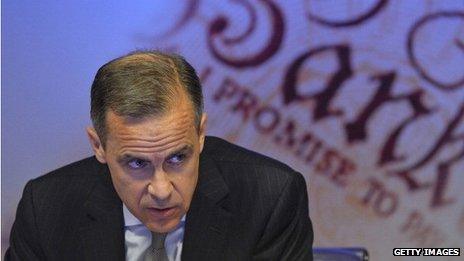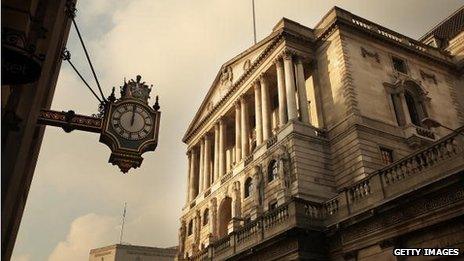Forward guidance to be modified
- Published
- comments

Next Wednesday, when the Bank of England publishes its latest inflation report, the governor will unveil the future of what's known as "forward guidance".
This was Mark Carney's innovation of last August, which was intended to give a bit more certainty to all of us about the outlook for interest rates.
What he and the Bank's Monetary Policy Committee said was that they would not even consider raising interest rates, barring some dramatic worsening in the outlook for inflation, unless and until the unemployment rate fell to 7%.
At the time, the Bank of England did not expect the unemployment rate to drop to that level until 2016. So it was seen as a strong statement that we could all bank on record low interest rates for many months and years to come.
In practice, it hasn't quite worked out as planned, in that the unemployment rate is now only a whisker above 7%.
Which has led some to conclude that forward guidance has been a reputational disaster for Mr Carney and the Bank, and others to say that forward guidance is a bankrupt experiment.
So will forward guidance be buried next week, as a brave but failed initiative?
That is not my understanding.
I would expect forward guidance to be retained, but modified.
And the reason I think that, is because (as I have pointed out in Carney: interest rates permanently lower) Mark Carney is firmly of the view that the UK's economic recovery will not be entrenched unless households and businesses are convinced that interest rates will remain low for months and years.
The last thing he would want, I think, is to revert to a system in which every indication of the strengthening of the recovery would persuade investors that interest rates are about to rise - because that would have the consequence, which he would regard as harmful, that market interest rates would indeed rise, even if the Bank itself were not to alter the policy rate.
Forecasting mistakes?
Carney thinks it is beneficial to give businesses, households and investors a framework that reassures them interest rates are not about to leap - although he does not wish to excessively limit the Bank of England's room for manoeuvre.
Why is it so important for him that we are not constantly living in agonised expectation that the price of debt is about to surge?
It is because, as you know, there is so much debt bearing down on the public and private sectors - which means that any sharp jump in interest rates, or expectations of such a jump, could choke off spending and the recovery.
And that is also why Carney is not remotely embarrassed that version one of forward guidance has endured just six months: he would say those were six months in which businesses and households became more confident about spending and investing again, safe in the knowledge they were not about to be battered by higher interest-rate costs.

The Bank of England publishes its inflation report next Wednesday
If the UK is growing faster than most expected at the start of 2013, that - he would claim - has something to do with the message sent out by forward guidance that the Bank wants to keep interest rates close to zero for as long as possible.
On this analysis, the Bank of England's crime was in the forecasting department, in that it was a bit more wrong than other economists about the outlook for unemployment.
Is it a revelation that the Bank of England makes serious forecasting mistakes? Well, some would say it is bigger news when its forecasts are correct.
But forecasting ineptitude is hardly unique to the Bank.
All that said, even if you agree with Mark Carney that forward guidance has proved a useful short term expedient, at this juncture it may be doing the opposite of what's intended - in that with unemployment almost at the relevant threshold, forward guidance has now engendered uncertainty about the outlook for interest rates.
Which is why the Bank of England will modify it next week.
'Change of philosophy'
How will forward guidance be changed?
Well the logic of Mr Carney's speech last month at the World Economic Forum would be to lower the unemployment threshold at which a rise in interest rates could be contemplated - because what he said then was that the Bank of England had revised down its estimate of the unemployment rate at which the labour market becomes tight enough for wage-inflation to start taking off.
But the problem with cutting the threshold on its own is that, with the Bank having proved so fallible in forecasting unemployment, the reform would probably not be enough to reassure investors, businesses and households that they had all the robust information they need to make important economic decisions.
Maybe therefore the Bank of England will augment the forward-guidance system. One possibility would be to import the practice of the US Federal Reserve, whereby the members of the MPC would reveal their own expectations for the course of interest rates (the so-called "dot" charts).
In doing so, the Bank would provide new guidance about how close the members of the MPC are to a consensus of the need for rates to rise.
The big thing to note, however, is how much of a departure all this represents from the previous regime under Mervyn King - since his mantra at every one of his press conferences was that he simply could not comment on the likely path of interest rates.
Since Mr Carney was appointed, I am not sure I can remember a single public appearance in which he did not signal his desire for interest rates to remain low.
Which is more than a change in tone: it is a change of philosophy.
Whether in the long run this revolution will be good for the economy, or for the credibility of the Bank of England, is something we won't know till we're all feeling richer and happier or poorer and sorer.